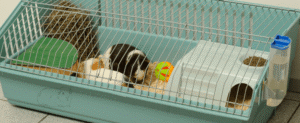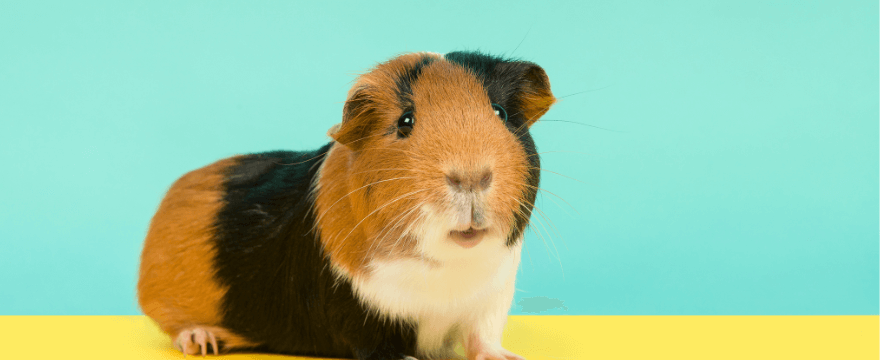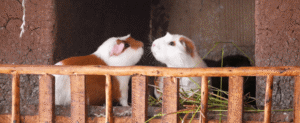Did you ever wonder, “Are guinea pigs hard to take care of?” when you were thinking about getting one? There are other people like you! A lot of people want to get one of these cute little animals but don’t because they don’t know how much care they need. I remember when I first thought about getting a guinea pig. Which made me want to know how much space they need. What do they eat? How long would it take me to take care of them?
A study by the American Pet Products Association found that guinea pigs are one of the five most popular small pets in the U.S.
However, many people who want to get one are worried about how much time and care they will need. This article covers everything from their basic needs to expert advice for easy and enjoyable care.
Getting to Know Guinea Pigs
Guinea pigs, or cavies, are small, gregarious rodents tamed for thousands of years. Their gentle nature makes them popular pets, especially with families. On the other hand, ignorance of their needs for care may result in unintentional neglect. You should know that guinea pigs need focused care, even though they aren’t as demanding as some pets.
How to Take Care of a Guinea Pig: The Basics
Housing
One of the first things you should do for a guinea pig is make sure it has a good place to live. The box should have enough room for people to move around and play. It’s best to give one or two guinea pigs at least 7.5 square feet of room, but more is always better. The cage’s floor should be solid, and it should be packed with safe, absorbent bedding made of things like paper. Cleaning often is important to keep trash and germs from building up.
Food Plan
A guinea pig needs well-balanced food to stay healthy. Good hay should be their main food source because it helps them digest and keeps their teeth healthy. Fresh veggies, like carrots, bell peppers, and kale, give you the vitamins and minerals you need. Guinea pigs can get extra nutrition from pellets made just for them, but you should stay away from mixes with seeds or nuts. Always make sure there is fresh water around. Things you should stay away from are iceberg salads, onions, and foods that are high in sugar or fat.
Good Health and Hygiene
To find problems early, it’s important to get regular health checks. Dental problems, lung infections, and skin problems are all common health problems. Guinea pigs also need to be groomed regularly. Long-haired types need to be brushed often to keep their fur from getting matted, and all guinea pigs need to have their nails trimmed every so frequently. Animals don’t need to be bathed very often, and it can make them nervous. If you do have to, use a gentle shampoo that is safe for pets.
Exercise and Fun Activities
Guinea pigs are busy pets that need to be taken for walks every day. Giving them a safe, limited space to explore outside of their cage can help them stay healthy and keep their minds active. Toys like caves, chew toys, and interactive toys can keep pets from getting bored and encourage them to act naturally. You can switch out the toys often to keep their surroundings interesting.
Commitment of Time and Money
To take care of guinea pigs, you have to feed, clean, and play with them every day. Health checks and thorough cage cleaning are done once a week. The cage and materials will cost money at first, and then food, bedding, and veterinary care will cost money on a regular basis. Putting money aside for unplanned medical costs is also a good idea.
Common Challenges and Ways to Fix Them
Health Issues
Some health problems, like tooth disease, respiratory infections, and parasites, are more likely to happen to guinea pigs. A healthy diet and regular trips to the vet can help prevent many of these problems. If a guinea pig shows signs of being sick, it needs to see a vet right away.
Behavior and Socialization
Guinea pigs are very social animals that love being around other animals. They may be shy at first, though, and may need time to get used to their owners. Building trust can be done by giving them a safe, quiet place to be and treating them with kindness and consistency. Guinea pigs can be kept together in pairs to keep them from being lonely and to encourage their natural social behaviors.
Keeping things clean
The box needs to be clean for your guinea pig’s health. Spot cleaning every day and a full cleaning once a week can keep waste and smells under control. Using safe, absorbent bedding and not giving your pet too much can also help keep the mess down.
How to Care for Guinea Pigs Without Much Trouble
Setting up a routine
Being consistent is important when caring for guinea pigs. Feeding, cleaning, and playing should all happen at the same time every day. This habit can help you take better care of your guinea pig and make it feel safe.
Use the Right Products and Tools
It can make a big difference to buy good items. Use a strong water bottle that won’t leak, safe blankets, and chew toys that will last. Grooming tools for small animals, like nail clippers and brushes, should be made just for them.
Making a Connection
Every day, spend time with your guinea pig. Talking slowly, petting gently, and giving treats can all help you bond with your pet. Your guinea pig will get more relaxed and friendly over time.
FAQs
Q: How often should I clean my guinea pig’s cage?
A: To keep the surroundings healthy, spot clean every day and do a full cleaning at least once a week.
Q: Can guinea pigs live alone?
A: If you want to keep guinea pigs, you can, but they do better in pairs or small groups.
Q: What vegetables are safe for guinea pigs?
A: Bell pepper, kale, carrots, and cucumbers are all safe veggies. Stay away from iceberg veggies and sweet foods.
Concluding Remarks
After learning all about how to care for guinea pigs, it’s clear that these cute pets do need some time and attention, but they’re not too hard to take care of. Guinea pigs can be great pets if they have the right housing, healthy food, regular checkups with their vet, and lots of love and attention.
To sum up, we’ve talked about the basics of taking care of guinea pigs, such as their housing needs, food, health and hygiene, exercise, and problems that they might have. We also gave you tips from experts on how to care for your guinea pig better and easier.


Leave a Reply